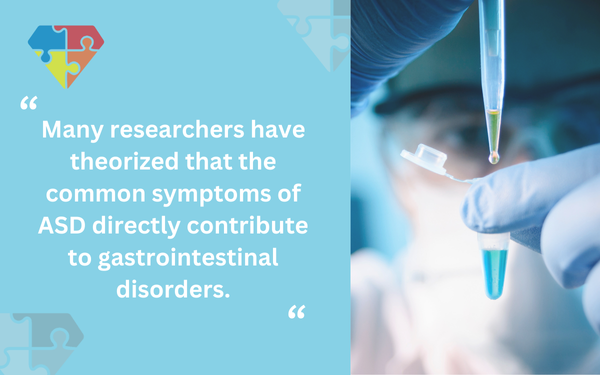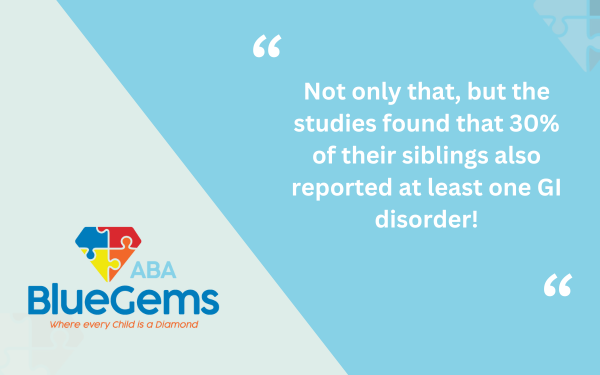Gastrointestinal Disorders and Autism
Children who have autism spectrum disorder (ASD) suffer from a greater number of medical issues, and more frequently, than their neurotypical peers1. These issues can span from immune system dysfunctions to gastrointestinal (GI) disorders.
Researchers have found in recent years that children on the autism spectrum suffer from many GI symptoms, including constipation, diarrhea, heartburn and general abdominal pain2.
There are many reasons for the links between gastrointestinal disorders and autism, though many of the most common ones that have been identified are related specifically to their behaviors. In other words, many children with ASD have GI issues because of how they behave and act due to their autism.
So, what are some of those autism behaviors that commonly cause GI disorders, and what can be done about it? Let’s examine that further.
Table Of Contents
What are Some of the Reasons Why Children with Autism Have GI Disorders?
Many researchers have theorized that the common symptoms of ASD directly contribute to gastrointestinal disorders.
Many children on the autism spectrum display selective eating3, for instance, which means they don’t eat a wide variety of foods. They might prefer to eat processed foods as opposed to whole grains, vegetables and fruits.

They also may have sensory sensitivities, with strong odors and flavors making them feel stressed, anxious and/or overwhelmed. This could also contribute to them going back to the same foods over and over again, as they are hesitant to try something different and/or something that they aren’t familiar with.
Both of these things easily can contribute to children with autism having diets that are very poor in nutrition. Because of the foods they eat and don’t eat, they have a higher risk of developing diabetes4, high blood pressure5 and obesity6.
In addition, they might lack essential nutrients that help with digestion and processing waste, such as fiber. That, in turn, can contribute to some of the most common GI issues listed above, such as diarrhea, constipation and abdominal pain.
Is There Truly a Link Between Gastrointestinal Disorders and Autism?
While a lot of that makes sense on the surface, is there any scientific evidence to back up the claims, or are they just theoretical?
In 2015, researchers from New York’s Stony Brook University took a closer look at those topics. They studied children who were part of the Simons Simplex Collection, which was a project focused on autism research.
Families who had children with ASD recorded what their children ate for an entire week, took stool samples and completed behavioral questionnaires. In total, the study examined 59 children on the autism spectrum, as well as 44 neurotypical siblings.
The research found that children who have ASD most commonly complained about heartburn, diarrhea and constipation. Among the children with autism, 42% had at least one GI issue, which was a much higher rate than children who were part of other general pediatric clinics.
Not only that, but the studies found that 30% of their siblings also reported at least one GI disorder. This part is particularly interesting, suggesting that the families could be following a poor diet as a result of the behaviors, habits and preferences of their children with ASD.

How Can Gastrointestinal Disorders and Autism Be Treated?
According to the research above, many of the GI disorders that children with autism suffer from are essentially self-inflicted. In other words, they commonly suffer from GI disorders because of what they eat.
The challenge, of course, is that it’s not as simple to get a child with autism to eat better as it is for a neurotypical child. Luckily, there are treatment plans that can help support children with autism in many ways, including applied behavior analysis.
ABA therapy, as it’s also called, is a science-based approach to learning and behavior that helps children with ASD build communication and social interaction skills, while also addressing things such as problem behaviors and sensory sensitivities.
Through ABA therapy treatment, children on the autism spectrum can build their communication skills to more effectively communicate with their parents and caregivers — which could lead to them expressing their preferences for food, which can result in healthier foods being prepared for them.
In addition, therapists can help children with autism work through sensory issues related to food, which break down the barriers of them eating new foods and a variety of foods.
All of this can help patients build more skills over time and hopefully lessen the effects of GI disorders.
Trust Blue Gems ABA with Your Child’s Treatment
ABA therapy is considered the gold treatment for children on the autism spectrum. Not only can it help children with ASD live more independently, but it can also help them alleviate some of the common signs of gastrointestinal disorders.
At Blue Gems ABA, our team of dedicated BCBAs work with children with autism every day, helping them build skills and modify behaviors so they can live happy, healthy and fulfilling lives.
To learn more, please contact us today.
References
- https://www.massgeneral.org/children/autism/lurie-center/30-facts-to-know-about-autism-spectrum-disorder
- https://pmc.ncbi.nlm.nih.gov/articles/PMC8608248/
- https://www.autismspeaks.org/expert-opinion/autism-and-food-aversions#:~:text=If%20you%20have%20a%20picky,)%20and%20meal%2Drelated%20tantrums.
- https://www.healthline.com/health-news/autism-may-increase-the-risk-of-diabetes-heart-disease
- https://pmc.ncbi.nlm.nih.gov/articles/PMC8987909/
- https://www.autismspeaks.org/expert-opinion/autism-obesity




